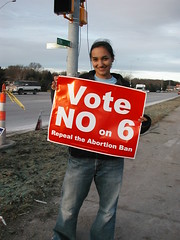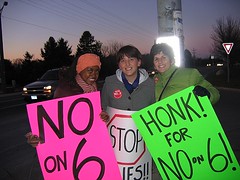strategy vs. conscience
I know, I know, it's been forever since I've updated. But I haven't forgotten about this blog, I swear. It just gets a little hard to keep up with when I'm trying to get through my senior year of college and having crazy relationship problems and insane amounts of schoolwork and intense campaign-induced senioritis.
I will eventually get back to regular updates, although I can't make any promises as to when that will be. Maybe during January, when I'm hanging around Northampton between the fall and spring semesters with nothing but cover letters and resumes and research to do.
But for now, I wanted to write about feminist existential crises. Specifically, the one that I've been trying to resolve since returning from South Dakota.

Election Day Morning Visibility, Brookings, SD
Background: I spent the 5 days leading up to The Big E-day (election day, Nov 7th) in Sioux Falls, South Dakota (and Brookings, SD, and Watertown, SD), volunteering with the Campaign for Healthy Families. PPFA/PP Action Fund paid for my plane ticket, hotel room, and food in exchange for my volunteering 5 days of my time to work against Referred Law 6, the abortion ban signed into law by SD Gov. Mike Rounds (who was, incidentally, somehow re-elected this year) last March. See, instead of PP challenging the ban in courts, as the legislators and governor had hoped and prepared for in hopes of overturning Roe, the SD Campaign for Healthy Families collected signatures and put the ban on the ballot for the voters to decide on. Which meant that an extensive campaign was formed to overturn the ban, which is where PPFA (and the ACLU, who also sent a ton of people) came in.

Jamia (from DC), Christine (native South Dakotan), and Gretchen (from New Haven, CT) - a few of the many incredible people working against Referred Law 6.
It was intense, and moving, and frightening, and life-changingly incredible. And, most importantly, WE WON (and yes, that is me in that picture, second from the left. score for me and Jamia, the two darkest people at the election night party in Sioux Falls. nothing like tokenism to gain you some fame.) I met incredible people, and I was actually doing things, things that mattered, instead of reading about doing things like I've done for the past 3 1/2 years while stuck in academia.
But there was something about the fight/success in South Dakota that never quite sat well with me.
South Dakota's demographics necessitated a strategy that I would not have chosen. SD is a red state. It helped George W get "elected" the first time around, and re-elected the second time. To make generalizations that are supported by polling numbers: they dislike gays (they were one of 7 states who passed the gay marriage bans this election), they don't like dark people (I was about as dark as tolerable, as was made perfectly clear while canvassing with Jamia, the only black person I saw in all of Brookings, where we were stationed most of the week), they don't particularly like women, and they're big on military and while they're split on the Iraq war, in the polls, most South Dakotans approve of it and the job Bushie is doing. In short, South Dakota isn't exactly the kind of bastion of liberalism (except in the traditional sense) that I would feel very comfortable in.

As a visual aid, there were a few of these scattered around the state in the days leading up to the election, with little resistance from South Dakotans.
The SDCHF and PPFA/PP of North Dakota-South Dakota-Minnesota conducted polls early on to give them information to shape their campaign strategy.
The strategy they shaped, then, was one that worked. But not necessarily one I was so ok with, given my conscience.
The approach we had to use was one that focused solely on the lack of exceptions provided in the law. The way it was written, the only exception to the full ban on all abortions exists for women whose lives would be in imminent danger if they were to go through with the pregnancy. There were no exceptions for if a woman's "mere" health were in danger, or for if a woman was the victim of rape or incest. This lack of exceptions, according to the polling that was done, was where the majority of South Dakotans felt the law went too far. And so, that was the part of the law that we attacked.
Our spiel (as I spoke it for between 8-12 hours per day, with the slight Midwest accent that I quickly picked up):
Hi, this is Jen, from the Campaign for Healthy Families. We're just calling [coming by] today to remind you how important it is to get out to vote on Tuesday, and specifically, how important it is to vote No on Referred Law 6. That's the abortion ban that has no exceptions for victims of rape or incest, or for if a woman's health is in danger. This election is going to be very close, so we wanted to make sure that everyone voting No on Referred Law 6 gets out to the polls this Tuesday. Polls will be open from 7am-7pm and you can cast your ballot at ____.
That was the GOTV spiel, not the Voter ID/Persuasion spiel, but the Voter ID/Persuasion spiel still spoke specifically about the lack of exceptions, said that the law "went too far." Still created all these ideological problems for me.
By focusing so intensely and specifically on the lack of exceptions, we were able to persuade voters to vote our way - by a 56%-44% margin, actually. (Still too close for comfort, but still a 12-point margin.)
However, by focusing so intensely and specifically on this lack of exceptions, we also reinforced the hierarchy of circumstances and stigmas surrounding the choice of abortion. That is, we didn't challenge - reinforced, actually - the idea that it's ok to have an abortion if your pregnancy is the result of incest or rape, or if your health or life is in danger, but for other reasons, it's not so ok. If your partner's condom broke? Sucks to be you. If the Pill just didn't work? Too bad - you shouldn't have been having consensual sex anyway, if you weren't willing to take on the consequences of such actions. It makes pregnancy into a punishment. It makes the right to an abortion contingent on how you got to the place where you need that choice.
Which is ridiculous. Your control over your body doesn't decrease if your pregnancy was not the result of violence. Control over your body is control over your body. You can't qualify it.
But we had to, in order to win. If we'd gone in there with a message that my conscience would have been totally ok with, if we'd used the whole "my body, my choice" line, we would have easily had our asses handed to us and set up the overturning of Roe v Wade. We would have effectively lost the right to abortion for women throughout the country.
So we had to sacrifice our conscience, to a degree. We had to closet ourselves as "radical" pro-choicers who believe in the unqualified right to abortion and focus on qualifiers that were left out of the law.
We had to, in effect, strategize away our conscience for the good of the movement.
But when does it become ok to sacrifice the rights of some (in this case, women who were impregnated not through acts of violence or who didn't have life- or health-threatening pregnancies) in order to secure rights for others? When do these sacrifices become too much?
If you have to strategize away your conscience, how can you be ok with that strategy? If that's the only way you can get even minimal rights for women, does that make it ok? Is it worth it to put the rights of others aside to gain minimal basic rights for those that the majority will give rights to? Is strategic incrementalism really what the feminist movement should be embracing? Can we ignore the rights of some (even "temporarily") in favor of small gains for others (usually white, middle- or upper-class women)?
I know that as an activist, I'm not going to always be able to take the stands I feel comfortable taking because the situation is not always going to allow for it. I know that you can't be idealistic and pretend that the message you want to send will be warmly received in the majority of America. Because the fact remains that the majority of this country is not as pro-choice as I am. Doesn't believe that bodily integrity is a fundamental human right that should be extended to women. And while that's what we have to work toward changing, that's also what we have to work with.
In the comments on feministing recently, Amanda (of Pandagon said, wisely: "However, feminists have to work with the world we've got, not the one we want."
And I think I need to add to that. We have to work with what we've got, yes, but we also have to work toward what we want.
I wish more than anything that political strategy could work by being idealistic. By being all-inclusive all the time and by always employing good feminist, non-essentialist frameworks. And for a while, when I hadn't really left the liberal bastions of New York state and Northampton, Massachusetts, I thought that maybe it could. The people in my hometown, and especially the people here in Northampton, are actually pretty receptive to inclusive policy. But after being in Sioux Falls and Brookings, SD, and seeing "middle America," and actually finally experiencing people who may not think the way I do and may not have been raised the way I was...I've realized that can't happen. We can't have the perfect, all-inclusive strategy and actually be successful. We can work toward it, but we can't use it, not in the current political environment. Even with the huge gains the Dems, and women, and even queers (in AZ at least, kinda) made on November 7th this year, employing that kind of strategy would be asking to lose. Pushing the envelope is important. If you don't push the envelope, you don't get change. But over-pushing it causes severe backlash, and quite possibly sets you back further than you were when you started.
Something they don't teach you in school, even in women's studies or explicitly feminist academia, something incredibly disheartening:
In making and reading and analyzing theory, and even theorizing about political strategy, we can be inclusive and non-essentialist. We can be "good feminists."
But in strategizing and in political action, we can't be.
We've got to work toward the world we want, but we'll never get that world unless we work with the one we've got.
Labels: navel-gazing, reproductive rights

